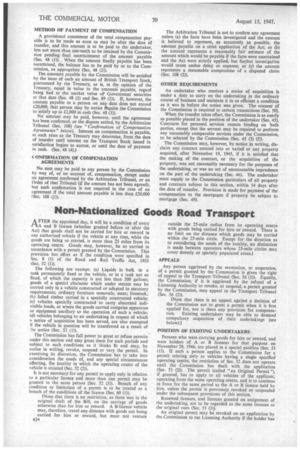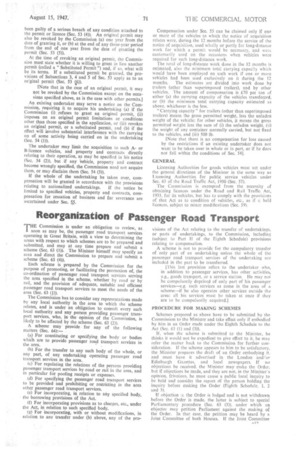Non-Nationalized Goods Road Transport
Page 44

Page 47

If you've noticed an error in this article please click here to report it so we can fix it.
AFTER the appointed day, it will be a condition of every A and B licence (whether granted before or after the Act) that goods shall not be carried for hire or reward in any authorized vehicle if the vehicle at any time, while the goods are being so carried, is more than 25 miles from its operating centre. Goods may, however, be so carried in accordance with a permit granted by the Commission. This provision has effect as if the condition were specified in Sec. 8 (1) of the Road and Rail Traffic Act, 1933 (Sec. 52 (1)).
The following are exempt: (a) Liquids in bulk in a tank permanently fixed to the vehicle, or in a tank not so fixed, of which the capacity is not less than 500 gallons; goods of a special character which under statute may be carried only in a vehicle constructed or adapted to statutory requirements; ordinary furniture removals; meat; livestock; 1b) felled timber carried in a specially constructed vehicle; (c) vehicles specially constructed to carry abnormal indivisible loads, or where the goods carried comprise apparatus or equipment ancillary to the operation of such a vehicle; (d) vehicles belonging to an undertaking in respect of which notice of acquisition has been served, are also exempted if the vehicle in question will be transferred as a result of he notice (Sec. 52 (I)).
The Commission has full power to grant or refuse permits under this section and may grant them for such periods and subject to such conditions as it thinks fit and may, by notice in writing, revoke, suspend or vary the permit. In exercising its discretion, the Commission has to take into consideration the needs of, and any special circumstances affecting, (he locality in which the operating centre of the vehicle is situated (Sec. 52 (2)).
It is not necessary for any permit to apply only in relation to a particular licence and more than one permit may be granted to the same person (Sec. 52 (5)). Breach of any condition or limitation of a permit is to be treated as a breach of the conditions of the licence (Sec. 60 (I)).
(Note that there is no restriction, as there was in the original draft of the Bill, on the carriage of goods otherwise than for hire or reward. A B-licence vehicle may, therefore, travel any distance with goods not being carried for hire or reward, but must not venture B34 outside the 25-mile radius from its operating centre with goods being carried for hire or reward. There is no limit on the distance which goods may be carried within the 25-mile circle. Except for the direction as to considering the needs of the locality, no distinction is made between operators whose 25-mile circles may cover densely or sparsely populated areas.'
APPEALS Any person aggrieved by the revocation, or suspension, of a permit granted by the Commission is given the right of appeal to the Transport-Tribunal (Sec. 56 (1)). Equally, the Commission, if it is aggrieved by the refusal of a Licensing Authority to revoke, or suspend, a permit granted by the Commission, may appeal to the Transport Tribunal (Sec. 56 (2)).
[Note that there is no appeal against a decision of the Commission not to grant a permit when it is first applied for, nor is there any provision for compensa tion. Existing undertakers may be able to demand compulsory acquisition of their undertakings (see below).] POSITION OF EXISTING UNDERTAKERS Persons who were carrying goods for hire or reward, and were holders of A or B licences for that purpose . on November 28, 1946, are placed in a special position (Sec. 53 (1)). If such a person applies to the Commission for a permit relating only to vehicles having a single specified operating centre, the restriction of Sec. 52 does not operate until the Commission has dealt with the application (Sec. 53 (2)). The permit (called " an Original Permit "), if granted, has to apply to all vehicles of the applicant, operating from the same operating centre, and is to continue in force for the same period as the A or B licence held by him, unless the permit is previously revoked or suspended under the subsequent provisions of this section.
Renewed licences, and licences granted on assignment of the undertaking, are to be regarded as the same licences as the original ones (Sec. 53 (3)).
An original permit may be revoked on an application by the Commission to toe Licensing Authority if the holder has been guilty of a serious breach of any condition attached to the permit or licence (Sec. 53 (4)). An original permit may also be revoked by the Commission (a) one year from the date of granting it, or (b) at the end of any three-year period from the end of one year from the date of granting the permit (Sec. 53 (5)).
At the time of revoking an original permit, the Commission must state whether it is willing to grant in lieu another permit (called a "Substituted Permit") and, if so, what will be its terms. If a substituted permit be granted, the provisions of Subsections 3, 4 and 5 of Sec. 53 apply as to an original permit (Sec. 53 (.6)).
[Note that in the case of an original permit, it may not be revoked by the Commission except on the occasions specified above, as is the case with other permits.] An existing undertaker may serve a notice on the Commission, requiring it to acquire his undertaking (a) if the Commission (i) refuses to grant an original permit, (ii) imposes on an original permit limitations or conditions other than those specified in the application, or (iii) revokes an original permit, or a substituted permit, and (b) if the effect will involve substantial interference with the carrying on of some activity being carried on in the undertaking (Sec. 54 (1)).
The undertaker may limit the acquisition to such Aor B-licence vehicles, and property and contracts directly relating to their operation, as may be specified in his notice (Sec. 54 (2)), but if any Vehicle, property and contract become wrongly specified, the Commission need not acquire them, or may disclaim them (Sec. 54 (3)).
If the whole• of the undertaking be taken over, compensation will be granted in accordance with the provisions
relating to nationalized undertakings. If the notice be limited to specified vehicles, property and contracts, compensation for cessation of business and for severance are ascertained under See. 5.5. Compensation under Sec. 55 can be claimed only if one or more of the vehicles to which the notice of ,acquisition relates were, during the 12 months before the service of the notice of acquisition, used wholly or partly for long-distance work for which a permit would be necessary, and were used on the occasions when vehicles were required for such long-distance work.
The total of long-distance work done in the 12 months is estimated, also the minimum total carrying capacity which would have been employed on such work if one or more vehicles had been used exclusively on it during the 12 months. The estimates are divided into work done by trailers (other than superimposed trailers), and by other vehicles, The amount of compensation is £70 per ton of either (a) the carrying capacity of the vehicles transferred, or (b) the minimum total carrying capacity estimated as above, whichever is the less, "Carrying capacity" for trailers (other than superimposed trailers) means the gross permitted weight, less the unladen weight of the vehicle: for other vehicles, it means the gross permitted weight less the sum of (i) the unladen weight, (ii) the weight of any container normally carried, but not fixed to the vehicles, and (iii) 500 lb.
Note that there is no compensation for loss caused by the restrictions if an existing undertaker does not want to be taken over in whole or in part, or if he does not fall within the conditions of Sec. 54].
GENERAL Licensing Authorities for goods vehicles must act under the general directions of the Minister in the same way as Licensing Authorities for public service vehicles under Sec. 63 of the Road Traffic Act, 1930 (Sec. 57).
The Commission is exempted from the necessity of obtaining licences under the Road and Rail Traffic Act, 1933, for its vehicles, but has to comply with the provisions of that Act as to condition of vehicles, etc., as if it held licences, subject to minor modifications (Sec. 59).




















































































